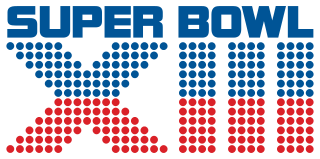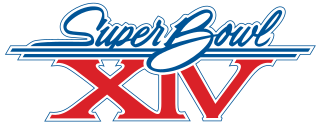Related Research Articles

Super Bowl IX was an American football game played between the American Football Conference (AFC) champion Pittsburgh Steelers and the National Football Conference (NFC) champion Minnesota Vikings to decide the National Football League (NFL) champion for the 1974 season. The game was played on January 12, 1975, at Tulane Stadium in New Orleans, Louisiana. The Steelers defeated the Vikings by the score of 16–6 to win their first Super Bowl championship.

Super Bowl X was an American football game between the National Football Conference (NFC) champion Dallas Cowboys and the American Football Conference (AFC) champion Pittsburgh Steelers to decide the National Football League (NFL) champion for the 1975 season. The Steelers defeated the Cowboys by the score of 21–17 to win their second consecutive Super Bowl. They were the third team to win back-to-back Super Bowls. It was also the first Super Bowl in which both participating teams had previously won a Super Bowl, as the Steelers were the defending champions and the Cowboys had won Super Bowl VI.

Super Bowl XIII was an American football game between the American Football Conference (AFC) champion Pittsburgh Steelers and the National Football Conference (NFC) champion Dallas Cowboys to decide the National Football League (NFL) champion for the 1978 season. The Steelers defeated the Cowboys by the score of 35–31. The game was played on January 21, 1979, at the Miami Orange Bowl in Miami, Florida, the fifth and last time that the Super Bowl was played in that stadium.

Super Bowl XIV was an American football game between the National Football Conference (NFC) champion Los Angeles Rams and the American Football Conference (AFC) champion Pittsburgh Steelers to decide the National Football League (NFL) champion for the 1979 season. The Steelers defeated the Rams by the score of 31–19, becoming the first team to win four Super Bowls. The game was played on January 20, 1980, at the Rose Bowl in Pasadena, California, and was attended by a Super Bowl record 103,985 spectators. It was also the first Super Bowl where the game was played in the home market of one of the participants, as Pasadena is 10 miles (16 km) northeast of Downtown Los Angeles.

Terry Paxton Bradshaw is an American former football quarterback who played in the National Football League (NFL) for 14 seasons with the Pittsburgh Steelers. Since 1994, he has been a television sports analyst and co-host of Fox NFL Sunday. Bradshaw is also an actor and recording artist, having participated in several television shows and films, most notably co-starring in the movie Failure to Launch, and releasing several country music albums. He won four Super Bowl titles in a six-year period, becoming the first quarterback to win three and four Super Bowls, and led the Steelers to eight AFC Central championships. He was inducted into the Pro Football Hall of Fame in 1989, his first year of eligibility. Bradshaw was inducted into the College Football Hall of Fame in 1996.

Joseph Clifford Montana Jr. is an American former football quarterback who played in the National Football League (NFL) for 16 seasons, primarily with the San Francisco 49ers. Nicknamed "Joe Cool" and "the Comeback Kid", Montana is widely regarded as one of the greatest quarterbacks of all time. After winning a national championship at Notre Dame, Montana began his NFL career in 1979 at San Francisco, where he played for the next 14 seasons. With the 49ers, Montana started and won four Super Bowls and was the first player to be named the Super Bowl Most Valuable Player (MVP) three times. He also holds Super Bowl career records for most passes without an interception and the all-time highest passer rating of 127.8. In 1993, Montana was traded to the Kansas City Chiefs, where he played for his last two seasons and led the franchise to its first AFC Championship Game. Montana was inducted to the Pro Football Hall of Fame in 2000.
Kenneth Allan Anderson is an American former professional football player who was a quarterback in the National Football League (NFL), spending his entire career with the Cincinnati Bengals. He later returned as a position coach.

Jerome Abram Bettis Sr. is an American former football running back who played in the National Football League (NFL) for 13 seasons, primarily with the Pittsburgh Steelers. Nicknamed "the Bus" due to his large size and forceful running style, he played college football for the Notre Dame Fighting Irish and was selected 10th overall by the Los Angeles Rams in the 1993 NFL draft. Bettis was a member of the Rams for three seasons before being traded to the Steelers, where he spent the remainder of his career. A six-time Pro Bowl and two-time first-team All-Pro selection, he is regarded as one of the greatest power runners of all time and ranks eighth in NFL rushing yards. He retired in 2006 after helping the Steelers win a Super Bowl title in Super Bowl XL, the franchise's first in over two decades. Bettis was inducted to the Pro Football Hall of Fame in 2015.
Kordell Stewart, is an American former football quarterback who played in the National Football League (NFL) for 11 seasons, primarily with the Pittsburgh Steelers. Nicknamed "Slash", he played college football for the Colorado Buffaloes football and achieved recognition as a senior for the "Miracle at Michigan", a Hail Mary pass he completed to defeat the Michigan Wolverines. He was selected by the Steelers in the second round of the 1995 NFL draft.
Kent Douglas Graham is an American former professional football player who was a quarterback in the National Football League (NFL). He played college football for the Notre Dame Fighting Irish before transferring to the Ohio State Buckeyes. After college, Graham had a lengthy career in the NFL with the New York Giants in two separate stints, as well as starting for the Arizona Cardinals and the Pittsburgh Steelers. He finished his career in 2002 with the Jacksonville Jaguars.
Michael Francis Kruczek is an American football coach and former quarterback. He is currently the Offensive Coordinator, under his son Garrett Kruczek, the head football coach for The Master’s Academy of Florida.
The National Football League playoffs for the 1975 season began on December 27, 1975. The postseason tournament concluded with the Pittsburgh Steelers defeating the Dallas Cowboys in Super Bowl X, 21–17, on January 18, 1976, at the Orange Bowl in Miami.
Walter Andrew "Bubby" Brister III is an American former professional football player who was a quarterback in the National Football League (NFL) for the Pittsburgh Steelers, Philadelphia Eagles, New York Jets, Denver Broncos, and Minnesota Vikings. He played college football for the Tulane Green Wave and Northeast Louisiana Indians before being selected in the third round of the 1986 NFL Draft by the Steelers.
Joseph Wiley Gilliam, Jr. was a professional football player, a quarterback with the Pittsburgh Steelers of the National Football League (NFL) for four seasons. Primarily a backup, he started the first six games of the 1974 season.
Michael John Tomczak is an American former professional football player who was a quarterback in National Football League (NFL) from 1985 through 1999. He played college football for the Ohio State Buckeyes. He played in the NFL for the Chicago Bears, Green Bay Packers, Cleveland Browns, and Pittsburgh Steelers.

Charles D'Donte Batch is an American former professional football player who was a quarterback in the National Football League (NFL). He played college football for the Eastern Michigan Eagles. He was selected by the Detroit Lions in the second round of the 1998 NFL Draft and played 15 seasons in the NFL, most of it as a backup with his hometown Pittsburgh Steelers, with whom he earned two Super Bowl rings.
The Pittsburgh Steelers are an American football franchise representing Pittsburgh. They are the seventh-oldest club in the National Football League (NFL), which they joined in 1933. The only surviving NFL teams with a longer history are the Chicago Bears, Arizona Cardinals, Detroit Lions, Green Bay Packers, New York Giants, and Washington Commanders. The Philadelphia Eagles joined the league concurrently with the Steelers in 1933.
The 1974 Pittsburgh Steelers season was the franchise's 42nd in the National Football League (NFL). They improved to a 10–3–1 regular-season record, won the AFC Central division title, sending them to the playoffs for the third consecutive season, and won a Super Bowl championship, the first league title in Steelers' history. This was the first of six consecutive AFC Central division titles for the Steelers, and the first of four Super Bowl championships in the same time period.
The 1975 AFC Championship Game was the sixth title game of the American Football Conference (AFC). Played on January 4, 1976, the game was hosted by the AFC Central champion and defending AFC and Super Bowl champion Pittsburgh Steelers who, in a rematch of the 1974 title game, played the AFC West champion Oakland Raiders at Three Rivers Stadium in Pittsburgh, Pennsylvania. Along with the 1975 NFC Championship Game played on the same day, this game constituted the penultimate round of the 1975–76 NFL playoffs which had followed the 1975 regular season of the National Football League (NFL).
The Broncos–Steelers rivalry is a National Football League (NFL) rivalry between the Denver Broncos and Pittsburgh Steelers. The rivalry stemmed from the eight playoff matchups between the two teams, some of which featured upset victories. Of the eight meetings, six resulted in the winner eventually advancing to the Super Bowl.
References
- ↑ "Terry Hanratty Bio :: Notre Dame Football :: UND.COM :: The Official Site of ND Athletics". und.com.
- 1 2 "Terry Hanratty". Pro-Football-Reference. Retrieved August 2, 2015.
- 1 2 1975 AFC Championship Game telecast. NBC Sports. January 4, 1976.
- ↑ "Terry Hanratty Stats - Pro-Football-Reference.com". Pro-Football-Reference.com.